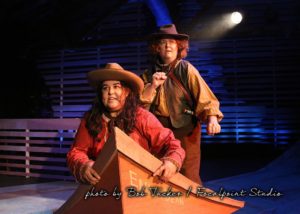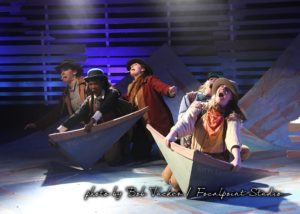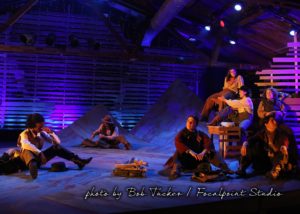Arts Week
Men on Boats is a Fantastic Ride
 Imagine being on a boat facing the rapids of a fast-moving river. Now imagine watching that experience take place on stage. And finally, imagine (if you can) that the latter doesn’t feel all that removed from the former, and you’ll have a sense of Men on Boats, currently playing at the Cape Rep. It’s exciting, it’s rollicking, and it’s great fun.
Imagine being on a boat facing the rapids of a fast-moving river. Now imagine watching that experience take place on stage. And finally, imagine (if you can) that the latter doesn’t feel all that removed from the former, and you’ll have a sense of Men on Boats, currently playing at the Cape Rep. It’s exciting, it’s rollicking, and it’s great fun.
The play doesn’t have a detailed fictional story arc: it’s based on the journals of John Wesley Powell, who in 1869 led a geographical expedition down the Green and Colorado Rivers into the great unknown canyon that Powell was the first to call grand. Each of the men on the expedition is represented in the play, as is the bonhomie, competiveness, courage, and fear that such an expedition would forcibly entail; Men on Boats stays close at all times to the historical narrative.
Except, of course, for the cast being all female.
This isn’t a gender-bending attempt to make a statement: in a sense, the reversal of gender roles opens the story up in ways that a male cast never could. We notice masculine mannerisms more when women do them, it highlights male speech patterns and approaches to problems, conflicts and aspirations, though it never allows them to become caricatures. The past is a foreign country, and this is as good a way to try and decipher its ways as any.
And it is funny. When one member of a two-person boat remarks, “There’s one dud in every boat,” his partner, deadpan, inquires, “Who’s the dud in our boat?” In  another moment of humorous insight after one of the four boats is destroyed by the rapids, someone says, “We’re going to lose some boats–we’re on a river!”
another moment of humorous insight after one of the four boats is destroyed by the rapids, someone says, “We’re going to lose some boats–we’re on a river!”
The expedition took place when the end of the Civil War was still very close–and very raw, and there’s a sense of that as well, from Powell’s own obvious disfigurement (he lost an arm in the war) to his brother Shady’s uniform hat and constant alertness to possible dangers, a little PTSD that goes nicely with the odd songs he springs on the others from time to time.
The play touches on what 21st-century viewers see as problems with the historical narrative, but lightly, with sarcastic Ute tribe members and Powell’s musing that “they’ve probably named all this area, and here we are, naming it again–after ourselves.” But those moments are few: most of the time what we’re seeing is, in fact, what the men experienced: the sheer excitement of a Great Expedition.
 The minimalist stage set is perfect for this production. The cast endures rapids and waterfalls, throws lines, portages, climbs cliffs, and all under the brilliant direction of Mo Hanlon who makes it all seem true, if not real. The choreography is intricate, the music choices whimsical, and the acting, frankly, superb.
The minimalist stage set is perfect for this production. The cast endures rapids and waterfalls, throws lines, portages, climbs cliffs, and all under the brilliant direction of Mo Hanlon who makes it all seem true, if not real. The choreography is intricate, the music choices whimsical, and the acting, frankly, superb.
There’s some courage involved in taking on a play that’s relatively new, and not every kink has been ironed out of this one; the last five minutes change gear from showing to telling, and that’s unfortunate, particularly since the rest of the play is not just a painless way to learn a little history but an exciting experience. This is the best ride you’ll go on all summer: be sure not to miss it!












